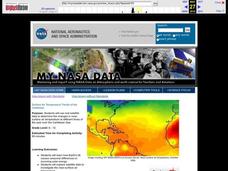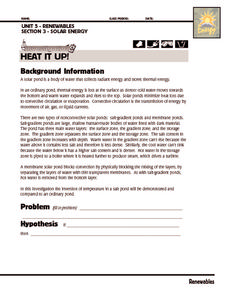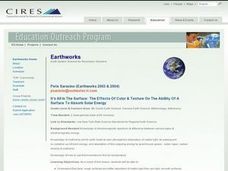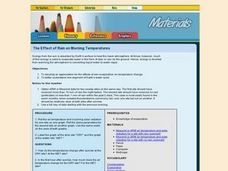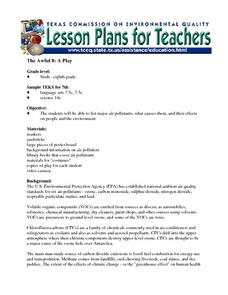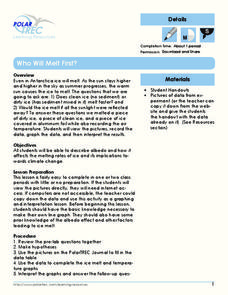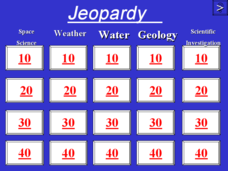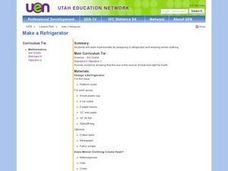Curated OER
Energy from the Sun
In this energy worksheet, learners conduct an experiment and observe the various ways in which heat energy can be transferred. They explain what happened to the wooden block when it was placed in direct sunlight. Students also explain...
Curated OER
Super-Fast Solar Flares!
In this solar flares worksheet, students observe a sequence of figures of a solar flare observed in 2003 from the Ramaty High Energy Solar Spectroscopic Imager satellite. Students solve 6 problems including finding the scale of each...
Curated OER
Regents High School Examination: Physical Setting Earth Science 2008
Throughout this earth science exam, high-school geologists complete a series of multiple choice and short answer questions about the solar system, atmosphere, and earth system. This is an amazing test, as are all of the exams developed...
Curated OER
Surface Air Temperature Trends of the Caribbean
Students investigate the seasonal changes to sea surface and near-surface air temperatures near the equator. They use actual satellite data to track and graph the differences in air and sea temperatures during different seasons in the...
Curated OER
Using Heat
The 6 slides give a few examples of ways that we use heat and heating systems. There is a diagram of circulation in a stove and forced air system as well as other examples of heat movers. Great for an introduction.
Texas State Energy Conservation Office
Investigation: Heat it Up!
This demonstration of solar ponds can be used in an earth, environmental, or physical science setting. Lab groups set up a solar pond and model how it is able, due to a salt concentration gradient, to maintain heat for future use.
Curated OER
The Earth's Atmosphere and Temperature
Students describe and compare the layers of the atmosphere. They explain how to measure the temperature of the atmosphere and discover what causes the atmosphere to heat up in some places more than in others.
Curated OER
It's All In The Surface: The Effects Of Color & Texture On The Ability Of A Surface To Absorb Solar Energy
Ninth graders examine how dark surfaces absorb more light than light surfaces. They perform an experiment that compares various surfaces abilities to absorb heat, then record and analyze the results.
Curated OER
Sunlight and Warm Air
Students examine the different ways heat can be felt. In this radiation and conduction lesson, students recognize that the sun radiates heat. Students conduct three experiments to find how the sun warms the Earth and how that heat is...
Curated OER
Temperature Changes: Atmosphere & Ocean
Pupils observe temperature differences of water and air in sunlight and darkness. They determine that the sun warms the Earth's surface, which controls global currents and climate, keeping the earth habitable. They discover water and air...
Curated OER
The Effect of Rain on Morning Temperatures
Eighth graders study the effects of the water cycle. They create a graph of the air temperature versus solar radiation on a rainy and clear 24 hour period using data from a provided link. Afterward, they answer questions to determine the...
Curated OER
Chemistry In Plant Nutrition And Growth
Pupils investigate different factors that affect plant growth. They research the effects of water supply, radiant energy, air temperature, and soil temperature. Students also gather facts that influence plant nutrition that include the...
Curated OER
What is Climate?
In this climate worksheet, students review the components that make up climate including temperature and precipitation. This worksheet has 8 true or false and 2 short answer questions.
Curated OER
A Comparison of Land and Water Temperature
Students use the NASA website's Live Access Server to create a graph of surface temperature at two locations on earth. They analyze the data and then answer specific questions provided in this lesson. They also examine and compare the...
Curated OER
The Awful 8: A Play
Students perform a play that presents the causes and effects on people and the environment of the eight major air pollutants.
Curated OER
Science Experiment: Take a Rainbow's Temperature
In this science experiment worksheet, students gather materials and perform an investigation using thermometers and prisms. Students are asked if red is hotter than blue. They answer 6 questions.
Polar Trec
Who Will Melt First?
If the Greenland ice sheet melted, sea levels would rise by about 20 ft; if the Antarctic ice sheet melted, sea levels would rise by 200 ft. Scholars explore ice melting through the analysis of different ice samples, clean and dirty ice....
Curated OER
Movement of Air
In this movement of air activity, students identify and describe the purpose for convection and how it effects Earth. Then they describe what thermals are and why they occur in hot and cold air movements. Students also explain why...
Curated OER
Lake Effect
Fourth graders explore some of the effects Great Salt Lake has on Utah's local weather/temperature moderation, lake effect storms, and temperature inversions. They observe the differences of specific heat between soil and water and...
Curated OER
Heat Absorption and Radiation
Learners experiment with the concepts of absorption and reflection of radiant energy.
Curated OER
Jeopardy - Earth Sciences
Questions about water, weather, geology, astronomy, and the scientific process make up this Jeopardy game. It is a pretty well-rounded set of slides, although you may want to be aware that a few of the questions are specific to the state...
Curated OER
Transfer of Thermal Energy
In this thermal energy worksheet, learners will explore different ways heat is transferred including conduction and convection. Students will look at how insulators work and how room temperature can affect heat transfer. This worksheet...
Curated OER
Sun or Shade?
Third graders use a thermometer to measure the air temperature in several places around the school and then graph the data. They grow 3 plants in different sunlight and record the growth.
Curated OER
Make a Refrigerator
Third graders explore the concept of heat transfer as experienced in wearing winter clothing and analyzing the refrigerator.





